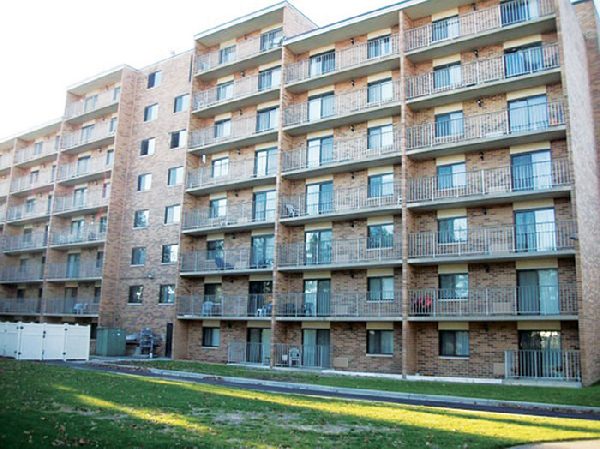
|
| Brown resides at Normandy Apartments in Dearborn, where several senior citizens experienced food stamp cuts |
DEARBORN – A local resident of a Dearborn senior citizen home claims she is struggling financially after the state drastically cut her food assistance benefits and local mosques have been negligent in aiding her.
Hala Anne Brown, who resides at the Normandy Apartments on Michigan and Telegraph, told The Arab American News that since November the state cut her food stamp benefits from $153 to just $16 a month.
Brown had been receiving food stamps for a few years, but said the state slowly began cutting her benefits. At one point she was receiving more than $200 a month.
She would use that money to purchase halal meat and fresh fruits from local grocery stores. Now, the $16 a month allocated to her isn’t enough to buy any of the essentials she would need to compliment her dietary needs.
“I can’t buy fresh fruit and I can no longer buy halal meat with just $16,” Brown said. “I can buy some coffee and cream and that’s about it. You are not supposed to cut off senior citizens like this. I am disabled and I’m 65 years old. I pray every day, because this makes no sense to me. I still haven’t gotten any answers.”
She does receive around $700 a month from Social Security, but that money is mostly used to cover her rent and pay for her car insurance. She would use the remainder of that money on gas and clothing.
Brown, who has lived at the Normandy Apartments for close to five years, said her children are barely able to assist her.
She has a son in the Air Force and a daughter who lives in Canton. Her daughter has to occasionally bring home-cooked meals for her.
Another son was killed in a motorcycle accident when he was 30-years-old. Brown has helped to raise his children and cook meals for them.
Due to the food stamp cuts, she’s no longer able to assist in raising her grandchildren. Family and friends now have to occasionally send her home-cooked meals instead, but it isn’t enough to take care of her daily needs.
Brown said she’s exhausted all her options in seeking help from the community and getting answers from the state as to why it cut her food benefits.
She said she tried asking for help at several places in Dearborn and Dearborn Heights, but all have been unable to assist.
The Salvation Army in Dearborn Heights was only able to provide her with cereal and canned beans that she claimed were expired.
When she reached out to The Islamic Center of America on Ford Road, the receptionist allegedly told her “we only help during Ramadan.”
“I called the mosques, I called the sheik and they always tell me he is too busy to speak with me, every single time,” Brown said. “I’m a shy person; I’m not a beggar, but I don’t know what to do anymore.”
Upon learning of Brown’s situation, The Arab American News contacted the Michigan Department of Human Services. A spokesman said the department would not comment on any individual’s case.
“Under law, I can’t provide any information about any individual’s public assistance or confirm whether an individual does or doesn’t receive public assistance,” said Bob Wheaton, manager of communications at the Michigan Department of Human Services.
Wheaton did disclose information that could possibly explain why Brown was drastically cut from state assistance.
Last year the state determined that it would cut food stamp benefits on home renters who don’t pay utility bills.
The farm bill signed into law last year cut back on the Nutrition Assistance Program, which included a provision that afforded extra food benefits to families who also receive assistance with heating bills.
The state had paid a minimum $1 fee to many households in order to qualify them for extra food benefits under federal law.
“The U.S. Farm bill passed by congress last year and signed by the president made a change in that loophole that required a state to pay $22 in energy assistance in order for those individuals to receive additional food assistance,” Wheaton said. “Michigan determined that it would be irresponsible to spend scarce energy assistance dollars by allocating that money to people with no energy expenses.”
Of the 16 states directly impacted by the new bill, Michigan was one of four that decided it wouldn’t pay a higher cost to help households avoid losing their food stamp benefits. As a result, more than 150,000 Michigan families lost an average of $76 in food stamp benefits last fall.
This leaves people like Brown in a bind. She said many senior citizens in her apartment complex have also been cut down drastically on food stamp benefits.
“I’ve called [governor] Snyder’s office and left messages and I get no response,” Brown said. “He does not care about senior citizens. It’s not fair to cut our food stamps. We aren’t going into the streets and buying drugs with this money. We are senior citizens and we just want food.”






Leave a Reply